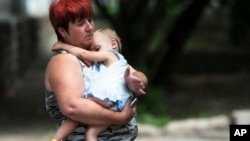The United Nations refugee agency reports more than 117,000 people are internally displaced in Ukraine and an estimated 168,000 have crossed into Russia. The UNHCR says humanitarian needs are increasing as the situation in Ukraine continues to deteriorate.
The U.N. refugee agency reports 87 percent of the total number of people displaced inside Ukraine come from the eastern part of the country, where government forces and pro-Russian rebels are waging a brutal war. The rest of the displaced, some 15,200, have fled from Crimea, which was annexed by Russia in March.
The director of UNHCR’s Europe Office, Vincent Cochetel, has just returned from back-to-back missions to Ukraine and Russia. He says the estimated number of 117,000 displaced people does not capture the full scope of internal displacement in Ukraine. He believes the true figure is much higher.
He says people are fleeing the fighting in eastern Ukraine in great haste, with limited possessions and increasing difficulties. During the last three weeks, Cochetel says, more than 1,200 people, mostly women and children, have been arriving every day at the frontline reception center bordering the Luhansk and Donetsk regions.
“Some of them arrived with almost no belongings or got some of their belongings confiscated at checkpoints. We see many families separated because the men are fearful to register. Some do not see any benefit of registering. Some fear some potential retaliation if they return later on, and some fear to be drafted in Ukrainian army," said Cochetel.
Cochetel says he was quite struck by the level of destruction he saw during his visit. He says basic services and infrastructure have been heavily affected by the increased violence and water is becoming increasingly scarce. He says many houses and buildings are either partially or completely destroyed in conflict-affected areas of Donetsk and Luhansk.
“That is what we are scared about, is that with the way the military operations are conducted, what will happen if we have an intense fighting inside the big urban center of Luhansk or Donetsk. So far, the fighting is in the suburb, but not in the city center. Fighting in highly dense urban area could lead to massive exodus or massive destruction. There are still 1.5 million people living in Donetsk as we speak," he said.
Cochetel says a mixed picture of displacement is emerging. He notes a substantial number of people are returning to areas where the Ukrainian government has regained control. He says people are getting tired of the current situation of violence and instability and want to get back to a normal life.
The Russian authorities report that about 730,000 Ukrainians have arrived since the beginning of the conflict. It says around 80 percent of Ukrainians are staying in border areas, while others are moving in with friends or relatives in other parts of the country.
The UNHCR says most Ukrainians leaving their country are not applying for refugee status because they fear this will lead to complications. It says they prefer to stay in Russia under the visa-free regime, which allows them to remain in Russia for up to 270 days.
Cochetel says at least more than 50 percent of these people say they would like to return to Ukraine at some stage. The others have not made up their minds.










